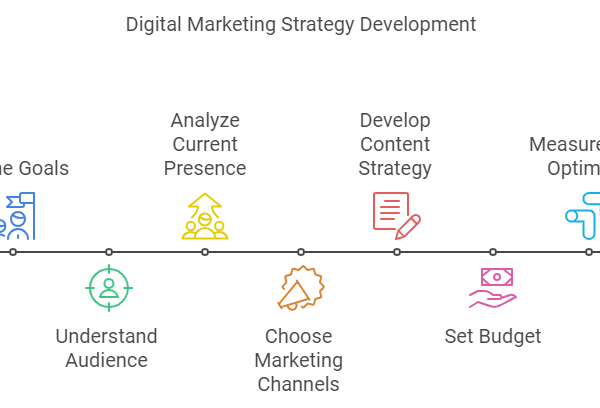
One of the most triggering facts of surviving in the present modern, digital world is the strong online presence of law firms. Whether you’re a seasoned attorney or a law graduate green from college, getting your SEO right could quite literally mean the difference between your online visibility being a hit or miss. Come along to the realm of SEO as we focus on what works best for law firms, with a touch of humor thrown in for good measure.
Why SEO Is So Important for Law Firms
After all, you’re a lawyer with an awesome office, a great track record, and a desk that oozes respect. But if your website is on the third page of Google search returns, you’re still a gem in the haystack. These days, people search for legal services online, so if you’re not showing up in their results, you’re potentially losing business.
The Best SEO Services for Lawyers
So, now we will discuss what is the criterion for being the best SEO service for lawyers. Not just throwing words at some wall, we are talking about a strategic approach to make your law firm rank high and pull in the right clients.
1. Keyword Research: The Base of SEO
Think of keyword research as preparing for this really big case. You wouldn’t show up in court without really knowing the ins and outs of your argument, would you? Well, you definitely need to know what potential clients are searching for. Make use of tools like Google Keyword Planner, SEMrush, and Ahrefs to help identify keywords that are on point with the services you offer.
For example, you could be a family law attorney and be hoping to target keywords like “divorce lawyer,” “child custody attorney,” or “family law firm.” But wait! The real catch comes with the use of long-tail keywords such as “best divorce lawyer in [your city]” or “affordable child custody lawyer near me” to cover more specifics in search inquiries.
2. On-Page Content Optimization
Once you have your keywords, then it’s time to optimize your website’s content. That’s where the magic happens. Here are some essential elements:
Title Tags and Meta Descriptions: All pages on your site should have unique title tags and meta descriptions containing your targeted keywords. This not only conveys to search engines the theme of your page but also increases click-throughs from users.
Header Tags (H1, H2, H3): This is where your header tags can be used to break up sections of your copy into much more manageable portions. When you also consider the fact that these keywords should be added to headers, this can really give your SEO a big boost in a case such as this. For instance, your H1 tag might read “Family Law Services, and under that, you may have an H2 tag marking “Divorce and Separation.”
Keyword Placement: Ensure you incorporate the right keywords naturally in the content. No keyword stuffing, as it has been so last decade. Ensure you have about a keyword density of 1-2%, more or less, and have some variations—looks fresh.
3. Creating High-Quality Content
Content is king, and for law firms, it’s an opportunity to showcase knowledge. You can use your blog to keep updating on very informative and engaging content, as this would set you out as an authority in your field. Write about common legal questions, recent cases, changes in law, and practical advice. This will not only bring good, useful information for the reader but also keep the website fresh in the eyes of search engines.
4. Local SEO: Attract Local Clients With This
Local SEO comes into play when your primary work is dedicated to sharing with clients within a particular geographical area. Here’s what you do:
Google My Business: Do claim and optimize Google My Business for businesses. It’s critical to ensure the best results that your name, address, and phone number (NAP) be consistent. You can also request satisfied clients to leave you a review.
Local Keywords: Add local keywords to your content; for example, “best divorce lawyer in [city]” or “leading criminal attorney near me.”
Local Citations: List out your law firm in local directories and legal sites. This will help build online credentials and improve your site’s visibility in searches.
5. Mobile Optimization: Everybody is on Their Phones
Did you know most searches are now done via mobile devices? If your website is not responsive, then you are possibly losing very many qualified clients. Make sure it is responsive, loads at good speeds, and presents users with a pleasant experience on all devices. Google is biased toward mobile-friendly websites; this is important.
6. Building Backlinks: The SEO Secret Sauce
After all, quality over quantity should be the real motto here. Links coming from reputable and relevant sites are what you’re looking for. You can accomplish this by being listed on some good legal directories, guest blogging on law-related blogs, and getting mentioned in local news articles. Not only is this great for SEO, but it also builds your credibility.
It is as important to know what not to do as what to do. Here are some common SEO mistakes law firms make:
Keyword Stuffing: An excess of keyword usage in your content will just hurt your ranking and make your content unreadable. Place an inordinate amount of keywords within your content, but ensure a natural flow.
Neglect Analytics: Services like Google Analytics will enable you to check up on the web performance time and again. You would know what works for you and where the much-needed improvements are.
Neglect Local SEO: When you are used to paying all your attention to broad keywords, you miss out on local clients. Local SEO is imperative for law firms.
Low-Speed Site: If your site is slow, it’ll irritate users, and it can impact your ranking. Cool trick: Learn how fast your page loads by using tools like Google PageSpeed Insights.
How to Measure Your SEO Success
So you’ve implemented these strategies. How will you know it’s working? Here are some key metrics to track:
Organic Traffic: Track the number of site users who find their way in from search engine results pages. A rise in organic traffic is good proof of the meaningfulness of your SEO strategies.
Rankings: Follow the rankings of your target keywords in search engine results. Improvements in your ranking mean you’re doing something right.
Conversion Rate: Track how many visitors or potential clients are concluding to convert. This is the ultimate measure of your SEO success.
Bounce Rate: A high bounce rate may infer the inability of your content to captivate or be useful to visitors. Try to maintain a lower bounce rate.
The Role of Social Media in SEO
While social media signals do not directly affect search results, they help you boost your SEO efforts. Posting your blog entries and legal insights on LinkedIn, Twitter, and Facebook will help boost traffic to your site and thereby increase your online visibility. Most social media profiles also tend to rank high in search engine results, providing you with more visibility and new client exposure.
Stay Ahead of SEO Trends
SEO is such a dynamic industry; therefore, keeping up with the trends is inherent to gaining substantial development in the matter. Being in the field grows by subscribing to SEO blogs, and engaging in forums online, and perhaps one of the best to really be in the know is attending as many SEO conferences as possible. Just remember, what is effective today may not be tomorrow, so be flexible.
Wrapping Up: The Best SEO Services for Lawyers
When it comes to handling SEO, it is not unlike getting ready for trial when it comes to success for your law firm. This means that you will have to research, strategize, and work on this continuously. You can master the art of being more visible online by focusing on keyword research, on-page optimization, compelling content, local SEO, mobile optimization, and linking so that you can drive more clients to your law firm. Some of the common pitfalls include not getting too caught up in KPIs, measuring what’s working, taking advantage of emerging social media trends, and avoiding common marketing mistakes to nail any of your competitors.
Don’t forget, though: the best lawyer SEO service is not just about ranking but about connecting with your audience and adding value. So get out there in that digital advocate hat of yours and start optimizing.











